2012版九年级英语 unit1《How do you study for a test?》单元检测题 人教新目标版
九年级英语全册《Unit 1 How do you study for a test(第1课时)》学

wordUnit1 How do you study for a test[学习目标]掌握重点单词和短语:aloud 高声地 pronunciation 发音 differently 不同地 quickly快地,迅速地 excited 激动的not at all 根本不 end up 结束 get excited about 对…感到兴奋 frustrate 使希望,使沮丧掌握重点句型:How do you study for a test ?I study by working with a group(2) What about reading to practice pronounciation?3.语法:how 用于询句“怎样”和by用于“告诉别人怎样做某事”时的用法4.运用已学知识与他人谈论如何学习第一课时(1a——2C)课前预习,预习时把这些题给做了,试试你的身手呀!翻译下列短语Work with fri带__________________MA大声朗读练习发音__________________9.study for a test_______________向警察寻求帮助____________________10.learn a lot__________________用所给词的适当形式填空。
You can find your purse by_________(ask)the police for help.It ‘s a fine day.What about __________(go)out for a walk?It’s a good way to practice ____________(speak)English every day.If you want to improve your______________(pronounce).you must speak more English.Talking with my friends in English can improve my _________(speak)skills.It’s too hard________________(understand)the voices.[重点点拨]aloud 为副词,意为“出声地,大声地”提高声音为了让人们能听见,loud为“响亮的”,指说话声和笑声等很响亮常用比较级形式lounder,loundly“大声地,吵闹地“指人的声音,敲门声等,强调声音高,比较喧闹,不悦耳令人感到讨厌。
(九年级英语教案)Unit1Howdoyoustudyforatest?全英文教案

Unit1Howdoyoustudyforatest?全英文教案九年级英语教案unit1 how do you study for a test?ⅰ. analysis of the teaching materialsin this unit, students learn to talk about how to study. such topic is very useful to students. it’s helpful to raise learning interest of all the students. either more or less advanced students will benefit a lot.1.the first period mainly gives students listening and oral practice using the target language "how do you study for a text? i study by doing…".2.the second period gives students more listening and oral practice using more target languages. they are helpful to improve students’ listening and speaking skills.3. in the third period, students learn to get detailed information from an article. it is a basic reading skill and is a great help to improve students’ reading skills.4. the fourth period not only introduces some new words but also provides students with many different kinds of activities. in this class, students learn to give advice to those who have difficulty in studying .5.the fifth period is designed to train students’ reading and writing skills.ⅱ. language functiontalk about how to study.ⅲ. target language1. how do you study for a test?i study by working with friends.2. have you ever studied with a group?yes, i have. i’ve learned a lot that way.3. i don’t have a partner to practiseEnglishwith. maybe you should join anEnglishlanguage club. ⅳ. structureverb + by\ with gerundⅴ. vocabulary。
《Unit 1 How do you study for a test?》教案(3)(1)
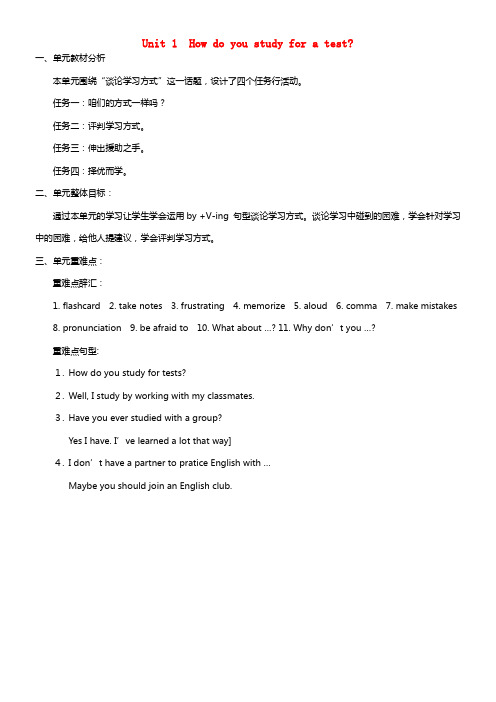
Unit 1 How do you study for a test?一、单元教材分析本单元围绕“谈论学习方式”这一话题,设计了四个任务行活动。
任务一:咱们的方式一样吗?任务二:评判学习方式。
任务三:伸出援助之手。
任务四:择优而学。
二、单元整体目标:通过本单元的学习让学生学会运用by +V-ing 句型谈论学习方式。
谈论学习中碰到的困难,学会针对学习中的困难,给他人提建议,学会评判学习方式。
三、单元重难点:重难点辞汇:1. flashcard2. take notes3. frustrating4. memorize5. aloud6. comma7. make mistakes8. pronunciation 9. be afraid to 10. What about …? 11. Why don’t you …?重难点句型:1.How do you study for tests?2.Well, I study by working with my classmates.3.Have you ever studied with a group?Yes I have. I’ve learned a lot that way]4.I don’t have a partner to pratice English with …Maybe you should join an English club.四、单元教学方式:采纳Concluding, Role playing 和Comparing 的学习策略,来展开课堂pairwork 问大师的口语交际活动和讨论活动来谈论名人所采纳的学习方式。
辞汇教学:情景操练,反复利用。
口语教学;师生互动,生生互动,对话练习,交际活动。
阅读教学:利用词典等工具书,依照上下文查寻词义。
语法教学:总结规律,仿照操练。
五、单元课时分派:本单元用四课时;第一课时―――语法和辞汇第二课时―――听说第三课时―――读写第四课时―――综合训练Unit 1 How do you study English?The first period ( grammar and vocabulary )1.知识目标:重点辞汇:flashcard, take notes, frustrating, memorize, aloud, comma, make mistakes, pronunciation, be afraid to, what about, why don’tyou…?重点句型:How do you study for tests? /Well. I study by working with my classmates.Have you ever studied with a group? /Yes, I have. I’ve learned a lot that way.I don’t have a partner to practice English with. /Maybe youshould join an English club.2.能力目标:⑴学会谈论学习方式⑵学会谈论学习中碰到的困难⑶学会针对学习中的困难,给他人提建议⑷学会评判学习方式二.教学重难点:1.重点:verb + by with gerund2.难点:运用所学知识谈论学习中的困难,并能提出相应建议。
九年级英语Unit1 How do you study for a test教案
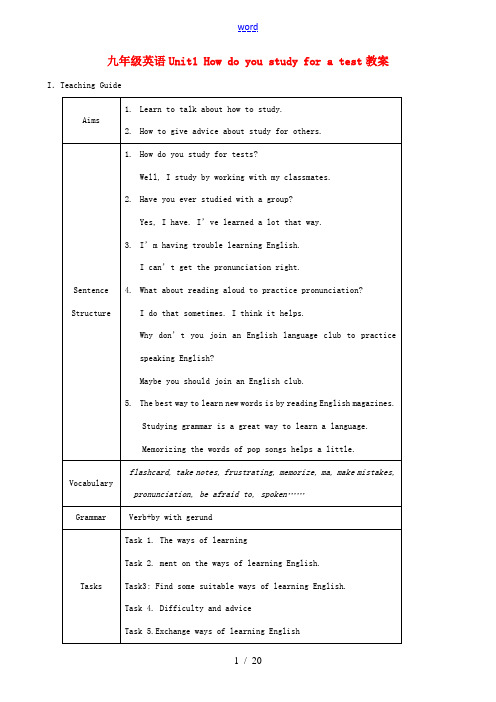
九年级英语Unit1 How do you study for a test教案I.Teaching GuideII.Teaching Procedures and TasksWord Study1.by(1) “方法或手段”,意为“通过;用……的方法”。
I study fro a test by working with friends.我通过和朋友们一起学习来参加考试。
(2) “以(某种方式)”,“通过”。
Don’t judge a man by his clothes. 不要以衣着取人。
(3)“通过……方式,传递的方式”等。
We went to Europe by water and returned by air.我们乘船到欧洲去,坐飞机回来。
Shall I tell you the result by letter or by telephone?我是写信还是打把结果告诉你?What do you mean by that? 你是什么意思?(4)“在身边,在手头”。
Have you got any money by you? 你身上带钱了吗?(5)“(时间)不迟于……,到……时为止,在……之前”。
You must hand in your homework by tomorrow afternoon.你们最迟明天下午要交作业。
(6)“凭借;靠;用;通过”。
She made a living by working as a waitress.她靠当侍者谋生。
(7)“由于……的结果,凭着”。
I’m sorry I took your umbrella by mistake.对不起,我错拿了你的雨伞。
(8)“被,由”。
He is reading a novel by Lu Xun.他在读鲁迅写的一本小说。
(9)“握(抓、拿)住(身体等的某部分)”。
The old man took the little girl by the hand.那位老人牵着那个小女孩的手。
九年级英语全册Unit1HowdoyoustudyforatestHowtolearnEnglish
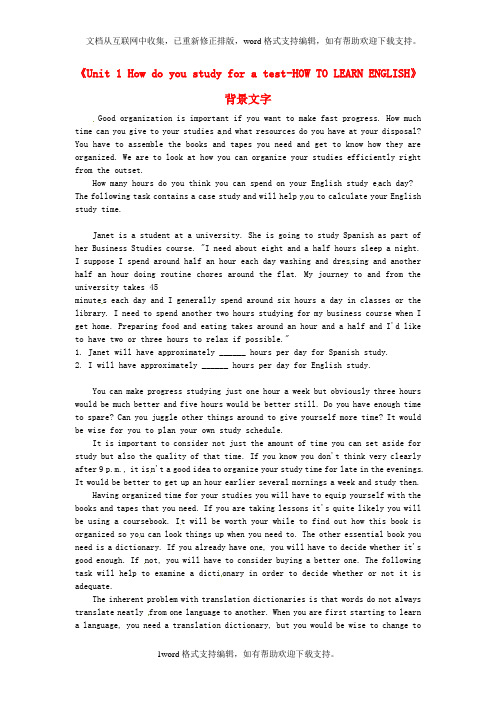
《Unit 1 How do you study for a test-HOW TO LEARN ENGLISH》背景文字Good organization is important if you want to make fast progress. How much time can you give to your studies a nd what resources do you have at your disposal? You have to assemble the books and tapes you need and get to know how they are organized. We are to look at how you can organize your studies efficiently right from the outset.How many hours do you think you can spend on your English study e ach day? The following task contains a case study and will help y ou to calculate your English study time.Janet is a student at a university. She is going to study Spanish as part of her Business Studies course. "I need about eight and a half hours sleep a night.I suppose I spend around half an hour each day washing and dres sing and another half an hour doing routine chores around the flat. My journey to and from the university takes 45minute s each day and I generally spend around six hours a day in classes or the library. I need to spend another two hours studying for my business course when I get home. Preparing food and eating takes around an hour and a half and I'd like to have two or three hours to relax if possible."1. Janet will have approximately ______ hours per day for Spanish study.2. I will have approximately ______ hours per day for English study.You can make progress studying just one hour a week but obviously three hours would be much better and five hours would be better still. Do you have enough time to spare? Can you juggle other things around to give yourself more time? It would be wise for you to plan your own study schedule.It is important to consider not just the amount of time you can set aside for study but also the quality of that time. If you know you don't think very clearly after 9 p.m., it is n't a good idea to organize your study time for late in the evenings. It would be better to get up an hour earlier several mornings a week and study then. Having organized time for your studies you will have to equip yourself with the books and tapes that you need. If you are taking lessons it's quite likely you will be using a coursebook. I t will be worth your while to find out how this book is organized so yo u can look things up when you need to. The other essential book you need is a dictionary. If you already have one, you will have to decide whether it's good enough. If not, you will have to consider buying a better one. The following task will help to examine a dicti onary in order to decide whether or not it is adequate.The inherent problem with translation dictionaries is that words do not always translate neatly from one language to another. When you are first starting to learn a language, you need a translation dictionary, but you would be wise to change toan explanation type as soon as possible.如何学英语如果你想取得很快的进步,良好的学习安排很重要。
九年级英语 Unit 1 How do you study for a test写作

Unit 1 How do you study for a test?【佳篇欣赏】AMy Ways of Learning EnglishEnglish is the most widely used language in the world. As a student in the 21st century, learning a foreign language well is necessary. Unfortunately, a few of my classmates don’t learn English well, so they want to give up. Therefore,I think I should help them with their English. Here are my ways of learning English.First of all, I usually learn English by listening to the tapes. Correct pronunciation is the most important thing for beginners. I listen to the tape carefully every evening and read every sentence after the tape to improve my pronunciation. In this way, my English sounds very nice now, and I am more confident in learning English.Second, I think reading is another important way to learn English. I usually learn new words by reading English magazines. By reading, I not only learn a lot of words, but also get to know how to use them. Reading helps me to understand grammar better, it makes grammar more interesting.As for speaking, I join the English cub to practice spoken English. I talk with different students and foreign teachers. In my opinion, the best way of learning English is talking in English as much as possible. Don’t be afraid of making mistakes because everyone makes mistakes.BHow to Learn English Well?English is one of the most important subjects in middle school. Almost everyone knows that we should learn English well, but few of us know how to learn it well. When one is learning a foreign language, he must use it. In fact, most of us learn English just by reading the textbooks and listening to the tapes. But we are afraid to speak. Don't be afraid of making mistakes. A saying goes that practice makes perfect. When we learn English, we should practice speaking every day in order to learn it better. The more we speak, the fewer mistakes we make. Only in this way can we learn English well.CMy Problems in Learning EnglishI have been leaning English for more than six years. I find it difficult for me to learn it well. I have some problems in leaning English. I can’t follow my teacher when she speaks English in class. I am really worried. I tried my best to learn English by memorizing all the grammar rules and new words, but I always make mistakes in grammar and spelling. What’s wrong? I feel frustrated.1.假设你是一名英语成绩优秀的初三学生,请你写一篇短文,简要总结自己近几年学习英语的成功做法。
九年级英语全册 Unit 1《How do you study for a test》Period 5教案 人教新目标版

Unit 1 How do you study for a test?The Fifth PeriodⅠ.Teaching Aims and Demands1.Knowledge Objects(1) Key Vocabularylater on, be afraid to, laugh at, take notes, enjoy doing, sentence, secret, learner, term, impress(2) Practice reading an article.(3) Practice writing something using the target language.2.Ability Objects(1) Train students' reading skill.(2) Train students' writing skill.3.Moral ObjectIf you have a better learning method, tell your friend to help him/her make greater progress.Ⅱ.Teaching Key Points1.Key Vocabulary2.Reading an article.3.Writing something using the target language.Ⅲ.Teaching Difficult Point:Writing a letter using the target language. Ⅳ.Teaching Methods1.Teaching by illumination2.Teaching by demonstrationⅤ.Teaching Aid:A projectorⅥ.Teaching ProceduresStep Ⅰ RevisionCheck homework. See if students have taught their partners how to learn English effectively.T: Liu Chang, what's your most helpful way of learning EnglishL: Listening to cassettes.T: Who did you teach to use the method ?L: Wei Ming. I told him to listen to cassettes every day. Besides, I encouraged him to write down what he hears every time.T: Well done. Remember to, encourage him not to give it up.L: OK.Say to the class, Check your partner's progress regularly and offer as much help asyou can.Show the key vocabulary words on the screen by a projector.later on 以后,随后be afraid to 害怕去做……laugh at 笑话;取笑(某人)complete adj. 完整的;完全的sentence n. 句子secret n. 秘密;机密learner n. 学习者take notes 做笔记;做记录enjoy doing 喜欢做……;乐于做……term n. 学期impress v. 使感动;给……深刻印象fast adv. 快地;迅速地Say the words and have students repeat after you again and again until they can pronounce the words fluently and accurately.Step Ⅱ 3aThis activity provides reading practice using the target language.Call attention to the article. Read it to the class or have a student read it for you. Point to the statements in the box beneath the article. Explain to the class that they will read the article and then write T or F after each statement.Point out the sample answer. Help the students find the information in the reading and read the sentence to the class:She spoke too quickly. Ask students to do the activity individually. Walk around the room answering any questions students may have about the reading.Check the answers. 1.F 2.F 3.T 4.T 5.F 6.T 7.TAsk, why are the false sentences false?Step Ⅲ 3bThis activity provides reading and writing practice using the target language.Call attention to the letter and point out that it contains several blank lines. Read the letter to the class saying blank each time you come to a blank line.Say, Please complete the letter on your own. Remind students that they should look back at Activity 2b. As they work, move around the room offering help and answering questions as needed.Check the answers by having a student write his/her work on the blackboard. Help correct any errors. Answers to the letter will vary.Step Ⅳ 3cThis activity provides writing practice using the target language.Read the instructions to the class. Demonstrate how to do the activity. Ask students to take turns suggesting things that have been the most helpful. Make a list of/ideas on the blackboard.Say, Write an article about the things that have helped you the most. Use these suggestions on the blackboard with your own ideas to write your article. You may also use the article in Activity 3a as a model. As they begin to write, move around the room providing help as needed. It doesn't matter whether they write only a sentence ora longer article. Ask students to read their letters to a partner.If there isn't enough time for all the students to finish the letter, allow them to finish it after class.The answers will vary.Step Ⅴ Part 4 InterviewThis activity provides oral and writing practice using the target language.Read the instructions to the class. Focus attention on the chart. Set a time limit of one minute. Students read the headlines and the questions silently.Demonstrate how to fill in the information in the chartAsk students to interview three students and fill in the chart. As they work, move around the room to make sure students interview in English and know how to fill in the information in the chart. Get a couple of students to tell the class about one of the people they interviewed. For example, My friend Wei Ming thinks grammar isn't easy for him. So he takes lots of notes in class. In his spare time, he likes listening to English songs.Answers to this activity will vary.Step Ⅵ SummarySay, In this class, we've mainly done much reading and writing practice.Step Ⅶ Homework(1) Finish off the article in Activity 3c.(2) Write about one of the people interviewed in Activity 4.Step Ⅷ Blackboard DesignUnit 1 How do you study for a test?Section BThe Fifth Period1.A sample letter to Activity 3b:Dear Wei Ming,I know it isn't easy to Learn English, but I have …, not every word. You also said that you often forgot a lot of new words. Well, try writing the new words in your notebook and studying at home. That helps a lot. If you keep on doing this, you will get good grades in English.Your friend,Liu Chang2.The most helpful ideas:listening to English songs reading English newspaper。
九年级英语 Unit 1 How do you study for a test 讲解与练习
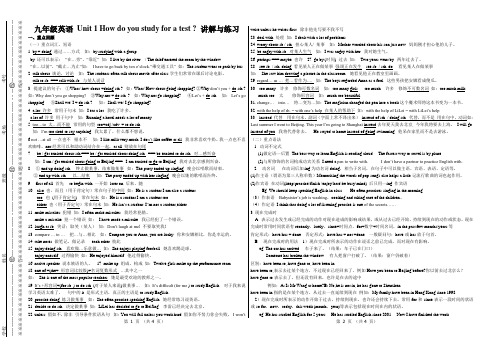
第 1 页 (共4 页) 第 2 页 (共4 页)学校 姓名 班级 考场 考号---------------------------------○密------------------ -------------------○封----------------------------- -- --○线----------------------------※※※※※※※※※※※※※※※答※※※※※※※※※※※※※※※※※※题※※※※※※※※※※※※※※※※线※※※※※※※※※※※※※九年级英语 Unit 1 How do you study for a test ? 讲解与练习一、重点回顾 (一)重点词汇、短语1. by + doing 通过……方式 如:by studying with a groupby 还可以表示: ―在…旁‖、―靠近‖ 如:I live by the river. / The thief entered the room by the window.―在…以前‖、―截止…为止―如: I have to go back by ten o’clock.―乘交通工具‖ 如:The student went to park by bus. 2. talk about 谈论,讨论 如:The students often talk about movie after class.学生们常常在课后讨论电影。
talk to sb. === talk with sb. 与某人说话3. 提建议的句子: ①What/ how about +doing sth.? 如:What/ How about going shopping? ②Why don’t you + do sth.? 如:Why don’t you go shopping? ③Why not + do sth. ? 如:Why not go shopping? ④Let’s + do sth. 如: Let’s go shopping ⑤Shall we/ I + do sth.? 如:Shall we/ I go shopping?4. a lot 许多 常用于句末 如:I eat a lot. 我吃了许多。
Unit 1 How do you study for a test
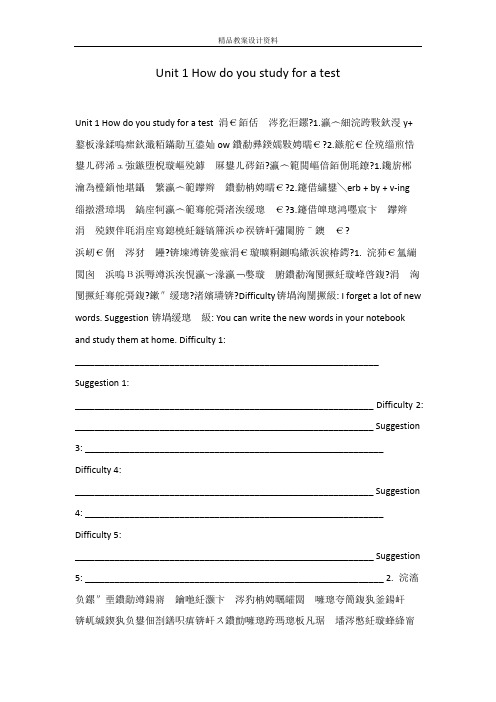
Unit 1 How do you study for a testUnit 1 How do you study for a test ?1.瀛︿細浣跨敤鈥渂y+鐜板湪鍒嗚瘝鈥濈粨鏋勪互鍙奾ow鐨勫彞鍨嬬敤娉曘€?2.鏃舵€佺殑缁煎悎?瀛︿範閲嶇偣銆侀毦鐐?1.鑱旂郴?2.鑳借繍鐢╲erb + by + v-ing?3.??锛堜竴锛夎瘯涓€璇曠粡鍘嗚繖浜涙椿鍔?1. 浣犻€氳繃В?闅撅紝骞舵彁鍑?鏉″缓璁?渚嬪瓙锛?Difficulty锛堝洶闅撅級: I forget a lot of new words. Suggestion: You can write the new words in your notebook and study them at home. Difficulty 1:_____________________________________________________________ Suggestion 1:____________________________________________________________ Difficulty 2: ____________________________________________________________ Suggestion 3: ____________________________________________________________ Difficulty 4:____________________________________________________________ Suggestion 4: ____________________________________________________________ Difficulty 5:____________________________________________________________ Suggestion 5: ____________________________________________________________ 2. 浣滀?(1). Listening skill: (2). Speaking skill: (3). skill: (4). skill: 锛堜簩锛夎繛璇嶆垚鍙?1. study, How , you , do , for , test a __________________________ ? 2. by, study, listening, I, tapes, to ,__________________________. 3. you, do , by , learn , reading , English , aloud__________________________? 4. should, find , you , pen pal a__________________________. 5. can鈥檛, a lot of , I , new , words , memorize__________________________?锛堜竴锛?a -1b Reading and checking 1. Learning English can be both easy and difficult. What things are easy for you? And what things are difficult for you? Easythings:_______________________________________________________________ _ Difficultthings:_____________________________________________________________ 2. 1b making a list. Now turn to page 5, read the list on the top and check 鈭歵he statements that are true for you. You have read and checked the statements true for you. Now think and make a list of other things difficult for you, too. 锛?锛塈don鈥檛know how to鈥? 锛?锛塤____________________________________ 锛?锛塤____________________________________ 锛堜簩锛塋istening 2a-2b 1. Paul is a nice boy. He works hard at his English, but still has many learning challenges. Now listen to find out what challenges he has and check them in the box on page 5. Challenges to Paul at learning English (1)._____ can鈥檛get the pronunciation right.(2)._____ forget a lot of new words. (3)._____ can鈥檛understand when people talk to me. (4)._____ can鈥檛understand the words in magazines. 2. 2b Listening and matching Now listen again to Paul talking about his challenges at learning English and match them with the solutions listed in the box on page 5. While listening, pay attention to the structures of the sentences. 锛堜笁锛?c Doing pair work 鏍规嵁涓?A: I don鈥檛have a partner to practice English with. B: Maybe you should join an English language club. A: I gorget a lot of new words. B: Why don鈥檛you write them in your notebook and study them at home? I don鈥檛have a partner to practice English with. Maybe you should join an English language club. I can鈥檛get the pronunciation right. Listening can help. I forget a lot of new words. Write the new words on cards and study them daily. I can鈥檛understand when people talk to me. You can join an English club to talk to people more in English. I can鈥檛understand the words in magazines. You can look them up in a dictionary. I don鈥檛get much writing practices. Start writing an English diary every day. I read very slowly. You should read to the recording of the text. I make mistakes in grammar. Why don鈥檛study the basic sentence patterns?锛堜竴锛夎瘝姹?1. 鏍规嵁鍙ユ剰锛岀敤鎵€缁欏崟璇嶆?(1). He studies English by (make) vocabulary lists. (2). You should pay more attention to your (pronounce). (3). I鈥檓too (excite) to say anything. (4). Can you always understand (speak) English? (5). I want some (suggest) about learning English. (6). Reading more books is (help) what to do today. (7). I can understand what they said (complete). (8). Everyone wants to become a good language (learn). (9). My grandfather enjoys (watch) Beijing Opera. (10). He has a good (memorize) for numbers. 锛堜簩锛夊崟椤归€夋嫨1. Have you studied working a group? A. by, to B. by, with C. in, to D. in, with 2. He is good at English, so it's for him to understand the English books. A. hard B. boring C. quick D. easy 3. Chinese English learners often talk about topics in English at first but up in Chinese at last. A. end B. start C. stop D. go 4. Although he practiced reading those English words a lot he the pronunciation. A. finished B. remembered C. forgot D. improved 5. Bob is a football fan and he almost every football game. A. watches B. sees C. finds D. looks at 6. I know you don't like spending time with strangers, . A. too B. either C.neither D. also 7. new English words in a vocabulary list is a good way to improve English. A. Getting down B. Looking down C. Turning down D. Writing down 8. Students often conversations in class to learn English. A. make up B. spell C. find out D. laugh at 9. English is in science. A. helpful B. specific C. popular D. original 10. Surfing is the most exciting sport that I have done. A. just B. yet C. never D. ever 11. He asked me 锛?A. whose dictionary it was B. whose dictionary was it C. whose dictionary is it D. whose dictionary it is 12. On my way home, I met an old friend of We hadn't seen each other for a long time. A. myself B. me C. my D. mine 13. Look at that book on the desk. It yours. A. maybe B. can C. may be D. must 14. The now is that we have lots of to ask. A. problem, questions B. question, problems C. question, problem D. problem, question 15. I have to go now. Please remember to the lights when you leave. A. turn off B. turn down C. turn up D. turn on涔燩3 浜斻€佹暀瀛﹀弽鎬濃€曗€曞惈鏁欏笀鐨勬暀鍚庡弽鎬濆拰瀛︾敓鐨?1.鎴戠殑鏀惰幏____________________________________________________________ 2.鎴戠殑鐤戞儜____________________________________________________________。
九年级英语Unit_1_How_do_you_study_for_a_test
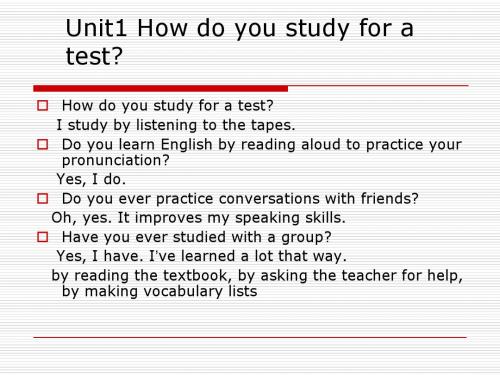
3. find用法 -----found(过去式)
1)find sth/sb +adj.
2) find+ doing sth +adj.
I find him friendly.
I find watching movies boring. 3) find it + adj.+ to do sth I find it boring to watch movies.
抱怨 complain about sth/doing sth complain to sb about 对某人抱怨… 把…变为… change …into… 他把坏事变成了好事。 He changed the bad things into good things. 在…的帮助下with the help of = with one’s help With the help of 七个小矮人=with 七个小矮人’s help 把…比作… compare…to… 把学生比作花朵 compare the students to flowers 代替 instead of 我们决定周末去钓鱼而不是打篮球。 We decided to go fishing instead of to play basketball. 他们不但不帮我,还笑话我。 Instead of helping me, they laughed at me.
写下
SectionA 一.重点单词变化
pronounce (v.)- pronunciation (n.)
Different (adj.)-differently (adv.)-difference(n.) Frustrat(v.)-frustrated (adj.)--frustrating (adj.) Quick (adj.)—quickly (adv.) Suggest (v.)—suggestion (n.) Help (v.)—helpful (adj.) Use (v.)—useful (adj.)
九年级全册Unit-1---How-do-you-study-for-a-test导学案
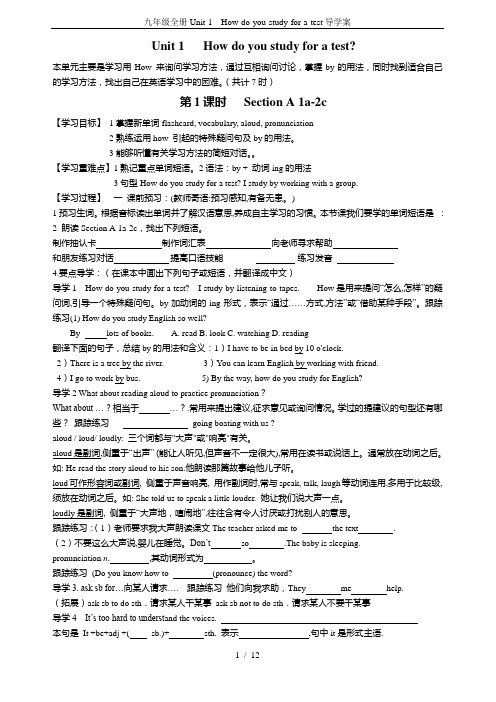
Unit 1 How do you study for a test?本单元主要是学习用How 来询问学习方法,通过互相询问讨论,掌握by的用法,同时找到适合自己的学习方法,找出自己在英语学习中的困难。
(共计7时)第1课时Section A 1a-2c【学习目标】1掌握新单词flashcard, vocabulary, aloud, pronunciation2熟练运用how 引起的特殊疑问句及by的用法。
3能够听懂有关学习方法的简短对话。
【学习重难点】1熟记重点单词短语。
2语法:by + 动词ing的用法3句型How do you study for a test? I study by working with a group.【学习过程】一课前预习:(教师寄语:预习感知,有备无患。
)1预习生词。
根据音标读出单词并了解汉语意思,养成自主学习的习惯。
本节课我们要学的单词短语是:2 朗读Section A 1a-2c,找出下列短语。
制作抽认卡制作词汇表向老师寻求帮助和朋友练习对话提高口语技能 _______ 练习发音4.要点导学:(在课本中画出下列句子或短语,并翻译成中文)导学1 How do you study for a test? I study by listening to tapes. How是用来提问“怎么,怎样”的疑问词,引导一个特殊疑问句。
by加动词的ing形式,表示“通过……方式,方法”或“借助某种手段”。
跟踪练习(1) How do you study English so well?By lots of books. A. read B. look C. watching D. reading翻译下面的句子,总结by的用法和含义:1)I have to be in bed by 10 o'clock.2)There is a tree by the river. 3)You can learn English by working with friend.4)I go to work by bus. 5) By the way, how do you study for English?导学2 What about reading aloud to practice pronunciation?What about …?相当于…?.常用来提出建议,征求意见或询问情况。
九年级英语第一单元知识点完整版

Unit1 How do you study for a test?熟记以下短语:making flashcards 通过做单词抽认卡2. ask…for help 向某人求助aloud 朗读way (=in that way) 通过那种方式my speaking skills 提高我的会话技巧example (=for instance)例如fun 玩得高兴conversations with friends 与朋友对话excited 高兴,激动up speaking in Chinese 以说汉语结束对话a survey about…做有关…的调查an English notebook 记英语笔记English (= oral English) 英语口语mistakes 犯错误the pronunciation right 使发音准确speaking English 练习说英语of all 首先with 以…开始on随后class在课堂上at 嘲笑notes 记笔记down 写下,记下up (v + adv) 查找,查询speakers 说本族话的人up 编造,虚构,化妆,打扮the world 全世界with 对待,处理,解决about (be worried about) 担心,担忧angry with 生某人的气angry 生气by 消逝34. regard…as…把…当做…about/of 抱怨36. change…into…把…变成…(= turn into) the help of 在…的帮助下38. compare…to (with)…把…和…作比较of (think about) 想起,想到problems身体上的问题off 中断,突然终止42. not…at all 根本不,全然不固定搭配、词语辨析:1. I study by working with a goup.by + doing 通过……方式如:by studying with a groupby 还可以表示:“在…旁”、“靠近”、“在…期间”、“用”、“经过”、“乘车”等如:I live by the river.I have to go back by ten o’clock.The thief entered the room by the window.The student went to park by bus.辨析: by with in onby 表示方式和手段时,有如下结构:a by+交通工具名称b by+doing sthc by+名词(名词前不加任何冠词)此时by表示使用的是无形的抽象的手段。
九年级英语全册《Unit 1 How do you study for a test(第4课时)》教
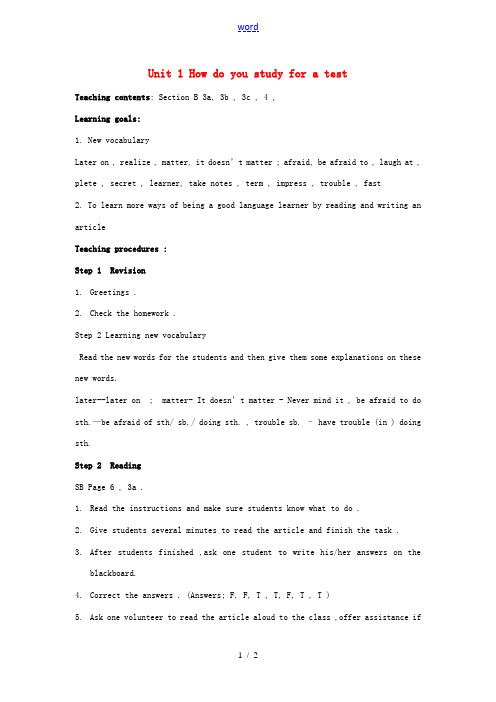
Unit 1 How do you study for a testTeaching contents: Section B 3a, 3b , 3c , 4 ,Learning goals:1. New vocabularyLater on , realize , matter, it doesn’t matter ; afraid, be afraid to , laugh at , plete , secret , learner, take notes , term , impress , trouble , fast2. To learn more ways of being a good language learner by reading and writing an articleTeaching procedures :Step 1 Revision1.Greetings .2.Check the homework .Step 2 Learning new vocabularyRead the new words for the students and then give them some explanations on these new words.later--later on ; matter- It doesn’t matter - Never mind it , be afraid to do sth.—be afraid of sth/ sb./ doing sth. , trouble sb. – have trouble (in ) doing sth.Step 2 ReadingSB Page 6 , 3a .1.Read the instructions and make sure students know what to do .2.Give students several minutes to read the article and finish the task .3.After students finished ,ask one student to write his/her answers on theblackboard.4.Correct the answers . (Answers; F, F, T , T, F, T , T )5.Ask one volunteer to read the article aloud to the class ,offer assistance ifnecessary .The other students underline the transitional words—first of all, to begin with , later on , then , nowStep 3 Writing SB Page 6 , 3b .First ,have students finish the letter on their own ,while they are working ,walk around and give them some help .Then ask two students to read their letter aloud to the class .Finally answer some questions the students may have .Step 4 Interview SB Page 6 ,Part 4 .1.Read the instructions and explain how to finish this task .2.Divide the class into groups of four .In each group ,each student takes turninterviewing the other students and take notes .3.Ask some groups to tell the class about their answers .Step 5 Exercises in classWork for Section B on B4 of Students TimesBoard design。
九年级英语全册 Unit 1《How do you study for a test
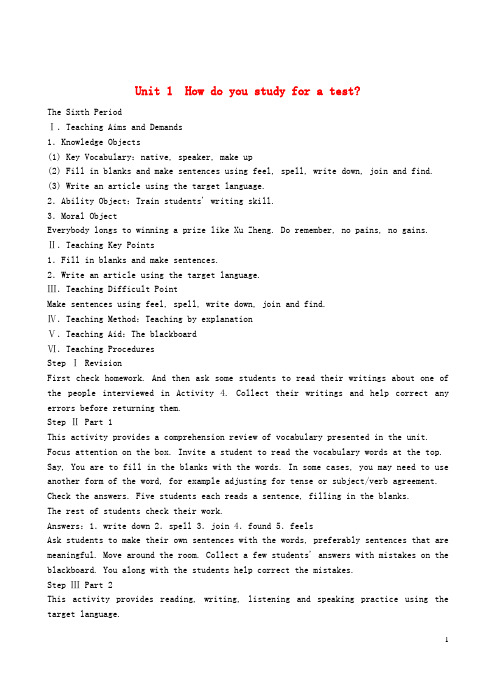
Unit 1 How do you study for a test?The Sixth PeriodⅠ.Teaching Aims and Demands1.Knowledge Objects(1) Key Vocabulary:native, speaker, make up(2) Fill in blanks and make sentences using feel, spell, write down, join and find.(3) Write an article using the target language.2.Ability Object:Train students' writing skill.3.Moral ObjectEverybody longs to winning a prize like Xu Zheng. Do remember, no pains, no gains. Ⅱ.Teaching Key Points1.Fill in blanks and make sentences.2.Write an article using the target language.Ⅲ.Teaching Difficult PointMake sentences using feel, spell, write down, join and find.Ⅳ.Teaching Method:Teaching by explanationⅤ.Teaching Aid:The blackboardⅥ.Teaching ProceduresStep Ⅰ RevisionFirst check homework. And then ask some students to read their writings about one of the people interviewed in Activity 4. Collect their writings and help correct any errors before returning them.Step Ⅱ Part 1This activity provides a comprehension review of vocabulary presented in the unit. Focus attention on the box. Invite a student to read the vocabulary words at the top. Say, You are to fill in the blanks with the words. In some cases, you may need to use another form of the word, for example adjusting for tense or subject/verb agreement. Check the answers. Five students each reads a sentence, filling in the blanks.The rest of students check their work.Answers:1.write down 2.spell 3.join 4.found 5.feelsAsk students to make their own sentences with the words, preferably sentences that are meaningful. Move around the room. Collect a few students' answers with mistakes on the blackboard. You along with the students help correct the mistakes.Step Ⅲ Part 2This activity provides reading, writing, listening and speaking practice using the target language.Read the instructions to the class. Ask students to look at the Notes on Xu Zheng and Notes on Xu Zheng's essay. Elicit how to convert the notes into sentences in an article. Instruct students to say, Xu Zheng likes writing notes , watching movies and listening to pop songs. He thinks most people speak English as a second language.Ask students to complete the work individually. Say, the order of information will vary but should contain all the points in the notes.As students are doing this, move around the room checking progress and offering help when necessary. If some students have difficulty in writing an article, encourage him/her to write two or three sentences.Step Ⅳ Just for Fun!This activity provides reading and speaking practice with the target language.Ask all the students to read the conversation. Ask, What is funny about this cartoon story? Help students to answer, The alien thinks he can learn English by eating an English hook. Invite pairs of students to present this conversation to the rest of the class.Step Ⅴ SummarySay, In this class, we've reviewed some vocabulary words presented in the unit. And we've also made up sentences using some words.Step Ⅵ Homework(1) Review all the language points presented in this unit.(2) Finish off the exercises on pages 3~4 of the workbook.Step Ⅶ Blackboard DesignUnit 1 How do you study for a test?Self checkThe Sixth PeriodSample answers to Activity 1:1.Please write down the words on the blackboard.2.I can't spell some English words.3.Why don't you join an English club?4.I have found my keys.5.Cotton feels soft.。
九年级英语全册 Unit 1 How do you study for a test(
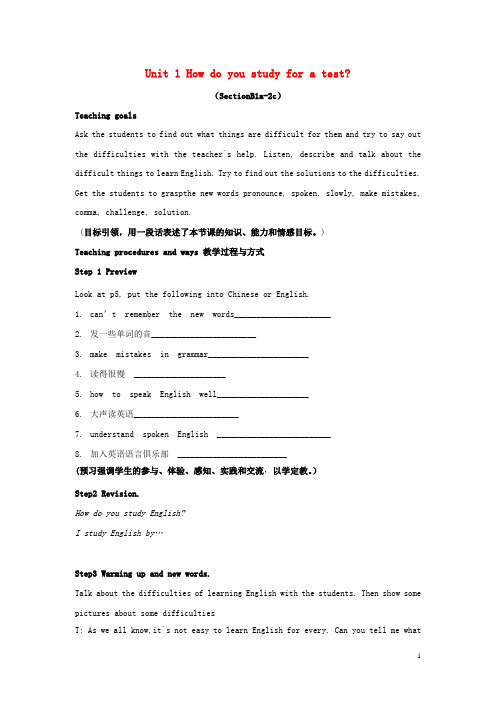
Unit 1 How do you study for a test?(SectionB1a-2c)Teaching goalsAsk the students to find out what things are difficult for them and try to say out the difficulties with the teacher`s help.Listen, describe and talk about the difficult things to learn English. Try to find out the solutions to the difficulties. Get the students to graspthe new words pronounce, spoken, slowly, make mistakes, comma, challenge, solution.(目标引领,用一段话表述了本节课的知识、能力和情感目标。
)Teaching procedures and ways 教学过程与方式Step 1 PreviewLook at p5, put the following into Chinese or English.1.can’t remember the new words______________________2.发一些单词的音________________________3.make mistakes in grammar_______________________4.读得很慢_____________________5.how to speak English well_____________________6.大声读英语________________________7.understand spoken English __________________________8.加入英语语言俱乐部_________________________(预习强调学生的参与、体验、感知、实践和交流,以学定教。
九年级英语全册 Unit1 How do you study for a test(第4课时)教案

5、Summary
1)What we learnt today.
2)做达标题。
生:小结。
做当堂达标。
6、Homework
Make a review.
【达标练习】
一、翻译短语。
犯错,出错以后,随后
没关系害怕去做,不敢去做
嘲笑做笔记
二、用正确的形式填空。
1、I spend more time(learn) English.
S: …
师生:互相问答,为短文阅读做好铺垫。
3、While) Read 3a carefully and write “T” or “F”.
3) Read aloud
4) Intensive reading
Language points:
三、情感目标:
谈论学习英语的好方法,并加以利用。
【教学过程】
【双边活动】
1、Warm up
1)检查生词的预习情况。
2)做新知预习练习题。
师:领读、纠正发音、强调发音规则等。
生:读、写、记忆单词,并做新知预习练习题。
2、Pre-reading
自由交际
T: How long have you learned English?
2、She enjoys(sing) English songs.
3、I have trouble(write).
4、My(speak) English is very poor.
【教后反思】
3a的阅读采用任务型教学,让学生一步步完成阅读任务。另外,读的不够熟练,课下多读几遍,加以强化。
Unit1 How do you study for a test
课题
- 1、下载文档前请自行甄别文档内容的完整性,平台不提供额外的编辑、内容补充、找答案等附加服务。
- 2、"仅部分预览"的文档,不可在线预览部分如存在完整性等问题,可反馈申请退款(可完整预览的文档不适用该条件!)。
- 3、如文档侵犯您的权益,请联系客服反馈,我们会尽快为您处理(人工客服工作时间:9:00-18:30)。
新目标九年级 Unit 1Ⅰ. 单项选择(15分)选择可以填入空白处的最佳选项。
( )1. — What do you think of dictionary on the desk, Zhang Ming?—It’s very useful, I think.A. aB. anC. theD. /( )2. — When I speak English, I always make .—Don’t be afraid of that. That’s how we learn.A. troubleB. mistakesC. influenceD. challenges( )3. I don’t have a partner to practice English on the weekend.A. toB. withC. andD. for( )4. I don’t like bread. I won’t eat it I am very hungry.A. whileB. whenC. asD. unless( )5. At first, our English teacher spoke English too , and we couldn’t understand what she said.A. quicklyB. clearlyC. easilyD. loudly( ) 6. I won’t take part in the party ______ Joe invites me.A. ifB. whenC. unlessD. because( ) 7. I went to visit him, I found, _______, that he wasn’t at home.A. howeverB. butC. andD. so( ) 8. I didn’t _____ I made a mi stake until the next day.A. findB. realize;C. rememberD. tell( ) 9. We know what we read can _______ our ways of thinking.A. faceB. solveC. influenceD. lose( ) 10. My brother is a stamp fan. He enjoys ______ stamps.A. collectB. collectedC. collectingD. to collect( )11. There are many ways learn a language. I think using it is the way.A. to; bestB. of; goodC. to; goodD. of; best( )12. — I have trouble my new computer.—Don’t worry. I’ll show you how it.A. using; usingB. to use; to useC. using; to useD. to use; using( )13. — did you tell him about the news, Lisa?— By an e-mail.A. How; sendingB. How; sendC. What; sendingD. What; send( )14. —I don’t know how to deal with these old books.— giving them to the children from poor families?A. What aboutB. Why don’t youC. Shall weD. Why not( )15. —I’m taking my driving test tomorrow.—!A. Take careB. Good luckC. Come onD. CongratulationsⅡ. 完形填空(10分)阅读下列短文,选择可以填入空白处的最佳选项。
“How can I learn English well?” “This is a 16 many students may ask. In my opinion, the most effective(有效的) 17 is to learn lessons by heart. If you can recite the text and write it out, you will learn it pretty well. And if you can tell 18__ your own words about 19 the lesson says, you are a very successful learner indeed. Your English will be quite perfect.This is a difficult task. However, if you try to learn by heart only part of each lesson, you’ll find it not so hard 20 you might have thought.Learn this way, and you will 21 fast progress. Of course, writing is also necessary. It helps you a lot on your way to 22 in English studies.It’s equally(同样地) important to feel the language. You should laugh at Englsih jokes and be 23 at bad news. When using English, try to 24 your mother tongue(母语). 25 helping you, your own language gets in your way. So, never try to learn English through putting every word into Chinese.( ) 16. A. problem B. puzzle C. question D. challenge( ) 17. A. time B. way C. road D. place( ) 18. A. with B. by C. of D. in( ) 19. A. which B. what C. how D. when( ) 20. A. than B. like C. so D. as( ) 21. A. do B. make C. learn D. develop( ) 22. A. success B. challenge C. difference D. importance( ) 23. A. happy B. happily C. sad D. sadly( ) 24. A. leave B. forget C. remember D. realize( ) 25. A. Instead of B. Instead C. Besides D. Except forⅢ. 阅读理解(30分)AYou have been working hard to learn English. Do you know American kids are trying to learn Chinese? More than 60,000 American students now study Chinese.“Because of China’s fas t development, Chinese has become more useful, and more and more Americans begin to learn it,” said Scott McGinnis, a Washington language expert (专家).For example, in 1999, only three schools in Chicago had Chinese lessons. This year more than 30 schools there have Chinese during school days. Last year China gave them 3,000 textbooks because they had done a good job.Although Chinese is becoming more and more popular, it is one of the most difficult languages to learn. Usually, an English speaker takes about 1,320 hours to become good at Chinese. He needs only 480 hours for French, Spanish or Italian.根据短文内容,选择最佳选项。
(10分)( )26. According to Scott McGinnis, more and more Americans begin to learn Chinese .A. because of China’s fast developmentB. because of China’s interesting cultureC. because they have more free timeD. because Chinese is easy to learn( )27. This year, schools in Chicago give students Chinese lessons.A. only threeB. thirteenC. over thirtyD. less than thirty( )28. The students at those schools in Chicago take Chinese lessons .A. after schoolB. at weekendsC. on school nightsD. on school days( )29. Last year China gave textbooks to those schools in Chicago.A. thirtyB. three hundredC. three thousandD. thirty thousand( )30. From the last two sentences we know that .A. Chinese is easier to learn than French, Spanish or ItalianB. Chinese is more difficult to learn than French, Spanish or ItalianC. English speakers like to learn French, Spanish or Italian more than ChineseD. English speakers like to learn Chinese more than French, Spanish or ItalianBDo you( ) 31. _______ will take you to see how people li ve in different countries.A. ElmoB. NemoC. WubbzyD. Jemima( ) 32. “ABC News” begins at ________.A. 8:30 amB. 2:10 pmC. 12:00 amD. 9:20 am( ) 33. Kids will NOT_______ in “Play School”.A. sing songs.B. draw picturesC. listen to storiesD. make things( ) 34. Peter should watch the program “______” if he wants to know about cats.A. Elmo’s WorldB. Play SchoolC. ABC NewsD. Travel Around the World( ) 35. The movie Finding Nemo is about a _______.A. boyB. girlC. fishD. toyCWhen you are learning a language, listening, speaking and writing are important, but reading can also be very helpful. When you read, you can not only learn some new words, but also learn how to use them. When you read a passage, it gives you a good example for writing.Here are some good reading tips.Firstly, try to read at the right level (水平). Read something that you can understand. If it is too hard for you, it is not interesting.Secondly, try to understand the new words. If there are four or five new wordson a page, don’t use a dictionary. Instead, try to guess their meanings as you rea d. Mark(作标记) them with a pencil. Then look them up in a dictionary when you finish reading, and write them in your own vocabulary book. Try to remember them.Thirdly, try to read for a short time once a day. Fifte en minutes or half an hour every day is better than two hours every Sunday. For example, you can read before you go to bed, or after you get up or at lunchtime.Lastly, read something that interests you. Choose a newspaper, a book or a magazine about a subject that you like. It will be easy enough for you to understand.根据短文内容,选择最佳选项。
